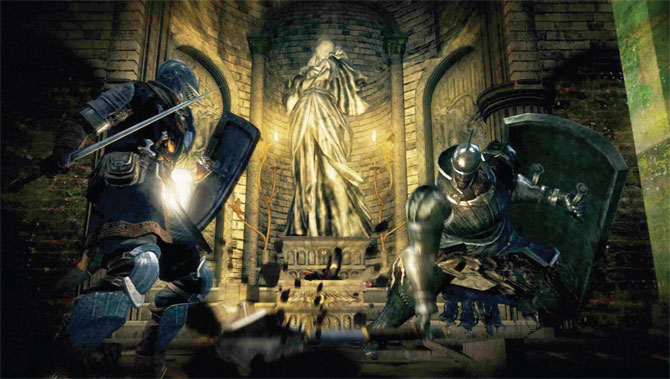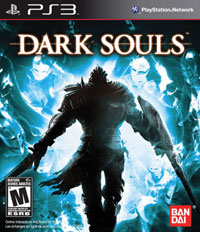

Publisher: Namco Bandai Games Dark Souls is a difficult action RPG. I usually define “action RPG” as a game with stat growth and equipment management where you control your character directly, rather than through menus. It doesn’t matter how I usually define “difficult,” because Dark Souls makes me redefine it. Dark Souls is hard. It’s the follow-up to From Software’s 2009 surprise hit, PS3-exclusive Demon’s Souls, which was also very hard, and which I played but neither beat nor reviewed. I haven’t beaten Dark Souls either. The great virtue of Dark Souls is the sense of ownership it bestows on those who master it. Unlike its predecessor, it’s an open-world game: After choosing your character’s class, gender, and appearance (and clearing out a brief tutorial dungeon), you’re dropped into the wilds of a fantasy setting next to a bonfire. Behind you are some ruins and a few skeletons that will laugh at your slashing sword and kill you dead. Most games use skeletons as the weakest of the enemies; these are some of the strongest. And if you push past the first few batches you’ll awaken, I dunno, an ogre skeleton or something, and I haven’t beaten it yet. Ahead of you is a path up a mountain where, the moment you engage with the first enemy you find, another enemy drops down to flank you while a third enemy you can’t even see hucks firebombs at your head. You’ll die a lot. In Dark Souls, your currency for buying equipment and leveling up is souls, and whenever you die you drop any you haven’t spent. If you can reach your corpse you get them back, but the game only saves your most recent corpse, so if you die on the way to recovering a big stash, it’s lost forever. You cannot save-scum; the game allows only one save file for each character and only saves when you quit to title. If you make a mistake, you can’t go back and reload. You will not want to die. You will be terrified of dying and losing your souls. You will die anyway, over and over, many times, each time losing what other games would let you keep. Instead, you’ll be keeping your experience—that’s your experience, not some “experience point” total—and eventually you’ll learn where the enemies are and how to beat them. You’ll learn never to fight in unexplored areas, but to lure enemies to familiar spaces. You’ll learn to progress slowly, observe everything around you, plan lines of retreat, the timing of a riposte, ambush spots, and how to sneak past and backstab enemies. When I play Dark Souls I feel like I am conquering a world. That level of difficulty isn’t something you find in most modern games, but it approximates the games I played when I was 12. Super Mario Bros. was a hard game back when everybody didn’t have every single one of its levels memorized. I wouldn’t want every title I play to be this difficult—it’d be exhausting—but it’s nice to have something with modern production values that demands this level of engagement. And speaking of production values, it really is a beautiful game. Ruined castles and dim forests demand to be explored, to see what’s around the next corner. For me, the reward for playing is twofold: the excellence the game demands and a chance to see more of it. This review is based on a retail copy of Dark Souls I purchased for myself.